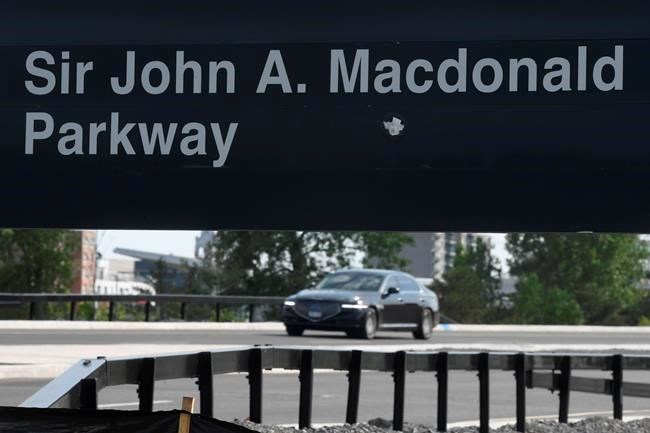OTTAWA — An Ottawa thoroughfare currently named after Canada's first prime minister is expected to receive a new Indigenous name later this year, the National Capital Commission said Thursday.
"I'm fully supportive of this decision," Ottawa Mayor Mark Sutcliffe said Thursday after the commission's board of directors unanimously approved the recommendation to move forward with renaming the Sir John A. Macdonald Parkway.
"I think this is something that Canadians and residents of Ottawa can be proud of once this process is complete," Sutcliffe said.
In June 2021, three Ottawa city councillors sent a letter to Prime Minister Justin Trudeau urging the federal government to facilitate an Indigenous-led consultation process to rename the parkway.
They wrote the letter after ground-penetrating radar located some 200 suspected unmarked graves at a former residential school site in Kamloops, B.C., saying there was an "urgent need" for Canada to commit to projects of reconciliation.
Macdonald authorized the creation of the residential school system while he was in power in the 1880s. It is estimated that more than 150,000 First Nations, Métis and Inuit children were forced to attend the government-funded, church-operated schools, where many suffered abuse and some died. The last such school closed in 1996.
On Thursday, the National Capital Commission, a federal Crown corporation, said it will engage with Indigenous communities and the public to discuss a new name and to encourage storytelling and sharing with the community.
It will propose a new Indigenous name for the road by June 2023.
The new name for the parkway will be shared at a –°¿∂ ”∆µ and public event on Sept. 30, the National Day for Truth and Reconciliation.
Coun. Theresa Kavanagh, who was one of the three city councillors who wrote the letter to Trudeau, called the discovery in Kamloops an "absolute turning point" and a "reality check."¬Ý
"It's moving at a snail's pace, but I'll take it as a sign of hope," Kavanagh said ahead of Thursday's update. "I hope that this means that they've been doing some consultation with the local First Nations communities."
Coun. Jeff Leiper, who penned the letter with Kavanagh, said he was very pleased to hear that the NCC was consulting with Indigenous communities on the decision.¬Ý
But he said that renaming the parkway cannot be a one-off act.¬Ý
"If you're going to put all of this work into developing a toponymy policy, that work needs to be applied to more than just the naming of one parkway," said Leiper.¬Ý
He said he hopes that once the new name is proposed and accepted, there will be more conversations about the importance of reconciliation through renaming monuments, parkways, buildings and other places whose names perpetuate colonization.
"I am encouraged that the NCC has put in the work to have that broader effort underway to decolonialize," he said.
Renaming just one roadway has been a long process so far.
CEO Tobi Nussbaum had told the commission's board last October that the renaming project was "underway."¬Ý
And last April, the commission had said in a press release that it provided its board of directors with an updated policy on toponymy ‚Äî or the study of place names ‚Äî to provide "a more transparent decision-making process for naming and renaming NCC-managed assets."¬Ý
It announced that a new advisory committee on toponymy was –°¿∂ ”∆µ formed that included members of the Kitigan Zibi Anishinabeg and Algonquins of Pikwakanagan First Nations, along with other local experts.¬Ý
"The committee's first order of business will be to consider an existing request for the renaming of the Sir John A. Macdonald Parkway," said the press release.¬Ý
The parkway has carried the first prime minister's name for just over a decade.
The Ottawa River Parkway was renamed in his honour in 2012, under the government of former Conservative prime minister Stephen Harper. At the time, the NCC said it cost $60,000 to change the four major signs along the roadside.
This report by The Canadian Press was first published Jan. 19, 2023.¬Ý
‚Äî‚∂ƒî‚∂ƒî
This story was produced with the financial assistance of the Meta and Canadian Press News Fellowship.
Cindy Tran, The Canadian Press
Note to readers: This is a corrected story. A previous version misspelled Kitigan Zibi Anishinabeg.




